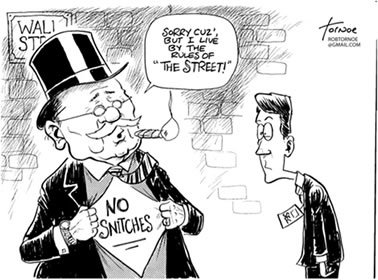Banks’ ‘No Snitch’ Mentality Bad For Us All
Three years after the great financial meltdown of 2008, leaders in the financial industry still haven’t acknowledged the systemic faults that led to it. Instead, we have seen them launch a high-profile public relations and lobbying campaign to limit proposed regulatory changes, saying that higher capital requirements and too much regulation will hinder the economic recovery.
Off the record, it’s another story. Almost everyone I talk to privately in the financial industry says there are six mega-banks that should be broken up or subjected to greater regulatory constraints — and that doing so wouldn’t hurt the economy one bit. When I suggest they speak out publicly, they say, “I just can’t break ranks with the rest of the industry.” It’s the Wall Street version of “No Snitch” tee shirts worn by inner city gang members, creating a self-enforcing culture of non-cooperation with law enforcement.
Everyone knows that the six mega-banks — JP Morgan, Citibank, Bank of America, Wells Fargo, Goldman Sachs and Morgan Stanley — are “too big to fail,” so large that the collapse of any one of them could bring down our entire financial system. The total assets of these six banks are now 64% of the U.S. Gross Domestic Product (GDP). Fifteen years ago the assets of the top six banks were just 17% of GDP. Most of that incredible percentage increase was the result of shotgun marriages during the precarious days of 2008. Bank of America absorbed Merrill Lynch and Countrywide; JP Morgan scooped up Washington Mutual and Bear Stearns; Wells Fargo swallowed Wachovia.

During Senate consideration of the Dodd Frank Wall Street Reform Act, I never understood why regional and small banks stood with the mega-banks in opposing congressional efforts to constrain systemic risk. They opposed the reinstitution of Glass Steagall, which from 1933 to 1999 had separated commercial and investment banks. They fought successfully against the Brown-Kaufman amendment, which placed a (still huge) limit on bank size and sought reasonable limits on leverage. And they were against derivatives reform, even though the big six do 85% of the trading in those complex instruments.
I still don’t get it. Because the market knows the government would never let the mega-banks fail, they borrow funds at rates substantially lower than smaller banks, putting those banks at a significant competitive disadvantage. This also puts the American taxpayer at risk as the mega-banks gorge on debt to fund risky trading strategies they hope will drive up their gigantic profits. Why do we let Goldman Sachs and JP Morgan keep growing as global financial behemoths, placing all of us at risk, when congressional action to limit their size would help other banks to better compete and serve U.S. commerce?
Robert Wilmers, the CEO of M&T bank — which just took over Wilmington Trust — is one banker who agrees. In a recent Bloomberg op-ed, he acknowledges that the growth of the major banks has resulted in “dangerous industry concentration.” He points out that 74% of the revenue of the six mega-banks come from trading, which is 93% of the trading revenue generated by all U S banks. He doesn’t think it is right that the top mega-bank executives are being paid at a rate 516 times the median U S household income. Nor does he think that Main Street banks should be asked to pay the higher regulatory costs needed to prevent TBTF banks from failing.
The conclusion of Mr. Wilmers’ op-ed deserves repeating:
“Main Street banks are heavily regulated — and have been for generations — to ensure their safety, soundness and transparency. A new generation of regulation must now be applied to what has become a virtual casino. All the players must be included — Wall Street banks, investment banks and hedge funds. Complex derivatives and credit default swaps must be brought out of the shadows and into public clearinghouses, so that markets can know their magnitude and extent.
Those financial institutions that engage in trading should live and die by the pursuit of their fortunes, rather than impose a burden on the whole economy.
It’s time to disentangle the trading of big financial institutions from their more traditional commercial banking operations and put an end to this unsafe business model.”
Amen. It’s also time for others in the financial industry to turn in their “No Snitch” tee shirts and speak out.
Originally published 27 Jun 2011 on huffingtonpost.com
